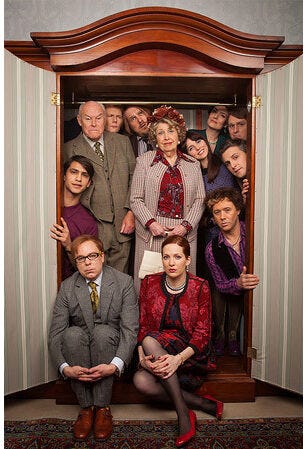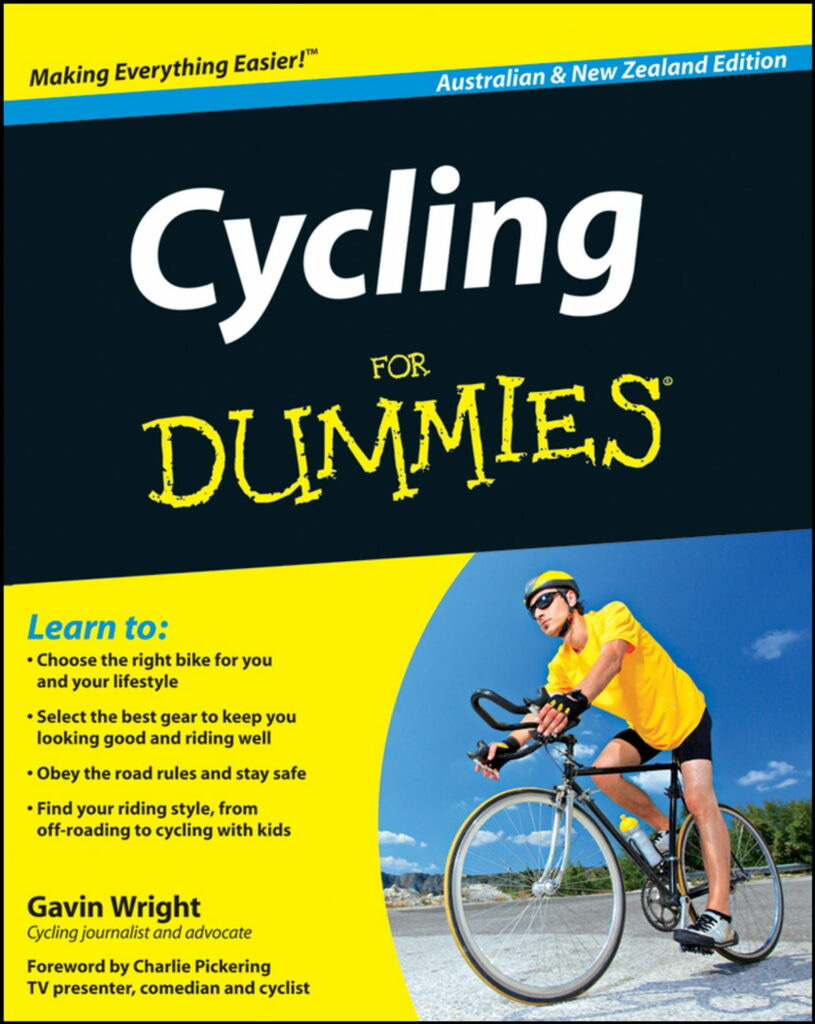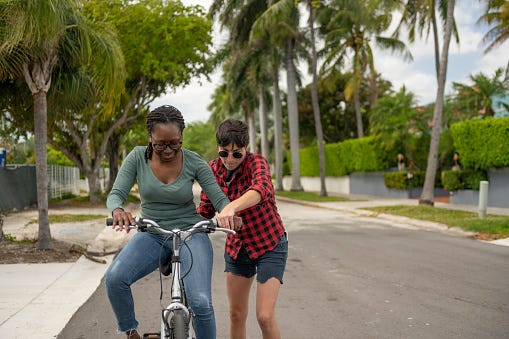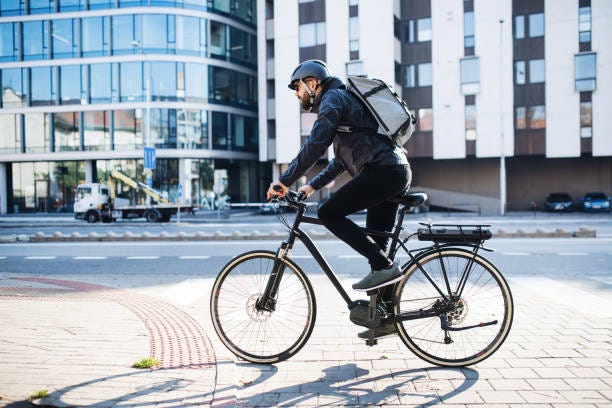The village of "me's": How to tend to the self and cultivate authenticity
The "Master Me" that I'm calling "I" reads the context and chooses a "me" to wear for that context. Think of a wardrobe, and you are selecting an outfit for an occasion or an event. It's kind of like that. I look at the car, immediately check for the car
“Me”, the agent in an arena
It seems to me that most of the time, the context in which I find myself dictates who I show up as. For example, when I’m driving the car, I am being “me”- the driver. As a driver, I’m sensitive to road signs, the lines on the road, other cars and their drivers. All things that I need to be aware of in that context are more salient to me over anything else if I am to be a good driver. Usually, when this is happening, I am not caring about the other variants of me like, say, “me”- the swimmer, “me”- the cook, “me”- the runner, etc. If I am doing the role of driving to the best of my abilities, I will temporarily ignore all the other “me’s” for the duration of the driving task. Once I arrive at the destination, park the car, and walk out, then I switch to a different “me”.
Tending the multiple “me’s”
These “me’s” all live in the “generalised me”. I remember a line from Sound of Music’s “Do-Re-Mi” that goes “, Mi, a name, I call my self”. That feels true to me. “Me” is the name I call my “generalised self”. The “generalised self” is what I would call the “Master Me”. This “Master Me” tends the village of the “me’s”. The “Master Me” that I’m calling “I” reads the context and chooses a “me” to wear for that context. Think of a wardrobe, and you are selecting an outfit for an occasion or an event. It’s kind of like that. I look at the car, immediately check for the car keys, decide where to put the phone and determine if I have everything I need before I begin. I do the same for other familiar tasks too. I browse the “me” collection and pick the appropriate “me” for the context. At least, this is how it happens when the context is familiar, and I know which “me” to show up as. The familiar context tells the “generalised me” how it works, and the “generalised me” makes the appropriate adjustments. There are times when the context is unfamiliar or confusing. Things get a bit tricky there.
The counterfeit “me’s”
In unclear contexts, knowing which “me” to show up as can be tricky. This is due to many reasons. The challenge is that the “Master Me” sort of freezes as it tries to calculate the “me” to put forth. When this happens, the other “me’s” want to be helpful, so they start speaking up and offering suggestions to help get unstuck. It’s like a disorganised town hall meeting in the village of “me’s”, where the members are speaking over each other and it is hard to hear properly what each “me” is trying to say and how they mean it. This, I have experienced as deep contemplation with my self. I call it “thinking”. I will tell those around me, “I have to think about this carefully because I’m not sure what to do”. So, I try to weigh my options and work out what I feel is the best course of action. Or rather, I consult the village of the “me’s” and decide which “me” to bring forth for the task at hand.
Sometimes, I prioritise other interests, like when I want to make a good impression on a group of people I just met. In this case, I would like all the “me’s” that have not represented me well in the past to stay in the closet, you know, like when a guest is coming over to your home and you tidy up by hiding the mess in a closet or room. I would rather only let out the “me’s” that I approve of so I can get the best representation available. In some situations, it’s difficult because I don’t have an impressive “me” to put forward for the role I have to play, so I have to make one up on the spot or as it’s commonly called, “winging it”. I do so by assessing the situation and building up a “me” that would fit that scenario appropriately, like when you re-write your resume to fit a job ad you would like to apply for and take out some of the experience that is irrelevant. Once I have built this “me”, I wear them and start to be them in the scenario. This goes quite well for that instance. However, in situations where the “me” in the closet is less favourable, I will create a new version for the same scenario. While this is fine temporarily, the challenge is that I have to store it back in the same closet as the less impressive “me”. Now I have a duplication of the same “me” in one village of “me’s”. This temporary “me” created to be impressive is what I’m calling the counterfeit “me”.
The counterfeit “me” is the “me” that I created to be impressive. The issue comes when I don’t have enough time to “think” about which “me” to wear for the scenario and have to pick one out fast. Because the counterfeit “me” is the impressive copy of a less impressive “me”, I’m likely to pick out the less impressive “me” since it is less effortful for me to be them. When this happens, the audience only familiar with the impressive “me” will be stunned by this mediocre “me”. The audience will wonder what’s happening and notice that I am being strange. And they will be spot on. However, I might not have noticed this yet, and if asked whether everything is alright and if I’m okay, I would confirm that everything is alright and that I am okay. This would even be more confusing for my audience. Nonetheless, I would continue wearing the less impressive “me” for that scenario. Think of when you have had a bad day at work; I’m reminded of those times in relation to this counterfeit “me” issue. It feels more like a “me double” type of thing because both of these “me’s” are dear to me and leave me wondering who I am. So, how do I resolve these counterfeits and clean up the closet? I have to create time to curate the closet and declutter it.
When I notice that I’m not showing up as I would like to in most scenarios, I think about taking a break and re-centring. This usually calls for me to create an opportunity to slow down things so that I have room to retrospectively assess and analyse my dysfunction or all the unintended ways I’m showing up. This reminds me of the origins of the word vacation. It originally meant to empty out. It’s like I have to empty out my closet of “me’s” and curate them before reassembling them back in. This, I believe, is the point of vacationing. It’s like servicing your closet of “me’s” and tuning it so that it works efficiently when you are back in the fast-paced life that is your day-to-day. In the process of curation, I’m able to notice the different shortcomings of my “me’s” and what they may need to grow into the more stellar and impressive “me” that I would rather have them be. When I was younger, I would feel sad about this and create more counterfeit “me’s”, older me is more empathetic to my “me’s”, and now I make a plan to cultivate them rather than be mad at them and challenge them to improve themselves.
Propositional knowing
I start with the Propositional knowledge which I collect through reading books, watching Youtube videos or taking a course on one of those free platforms like Coursera or Edx. Propositional knowledge is fact-based. It is knowing that a thing is. For example, if I am interested in bicycles or bikes, propositional knowledge would include bicycle history, bicycle mechanics, kinds of bicycles, how bicycles work, the cost, etc.
Procedural knowing
I then proceed to the Procedural knowledge which I cultivate by practising the new way of doing the thing. Here I will have to get a tool and learn to use it. For example, if I was working on riding a bike, this is the part where I acquire a bike to practice the new way of riding a bike that I’m learning. Say, I’m going from a regular bike to a road bike; I acquire a road bike and everything it needs and start learning how to work with this equipment.
Perspectival knowing
Next, I work on the Perspectival knowledge which I cultivate by joining a community of practice. This would be a community where the members take this domain of knowledge deeply seriously and practice regularly to improve their expertise in that area. For example, this is that part in my journey of cultivating the road biker “me”, where I join a team or club of road bikers and start attending meetings regularly where I share my experiences and learn from the other members.
Participatory knowing
Finally, I would then work on the Participatory knowledge which I cultivate by making this skill a part of my way of life. I mean that now I incorporate it into my daily life. For example, I start riding to work and back home instead of taking public transport. At this point, it’s a part of who I am. I identify as a cyclist. I will have taken the “me” who liked to ride bikes and developed their competency to the level where they are a cyclist, and when I need to be a cyclist, the cyclist me will always show up the way I would like “cyclist me” to show up. They will continuously get curated and upgraded daily.
Organising my village of “me’s”
Now that I’ve figured out how to cultivate the less impressive “me’s”, and I have a framework that I’m using, I have to scale that process and apply it to all the “Me’s” that I need to work on. It’s a bit challenging because while I appreciate how impressive a “me” can become, I’m not sure I can find enough time to curate each of them to that level. It feels like a lifelong mission. It also feels like I have to choose those “me’s” that are relevant currently since I have to get them aligned with my daily activities. That means I have to prioritise which “me’s” to work on now and which ones to work on later. I also have to pause some “Me’s” that I have been working on but have become irrelevant. It’s a lot of work. However, it feels like if I make this investment, I will be getting closer to a more accurate picture of the reality in which I find my self. And I will have fewer counterfeits in my closet of “me’s” or village of “me’s”. With an increase in the authentic “me’s”, I believe I will show up more authentically in the scenarios in which I have to participate. This authenticity will bring about more integrity and help me become that “me” that I aspire to be. So yes, the work is worth it. I encourage you to tend to your village of “you’s”, for you might become the most authentic person you have been striving to become.










